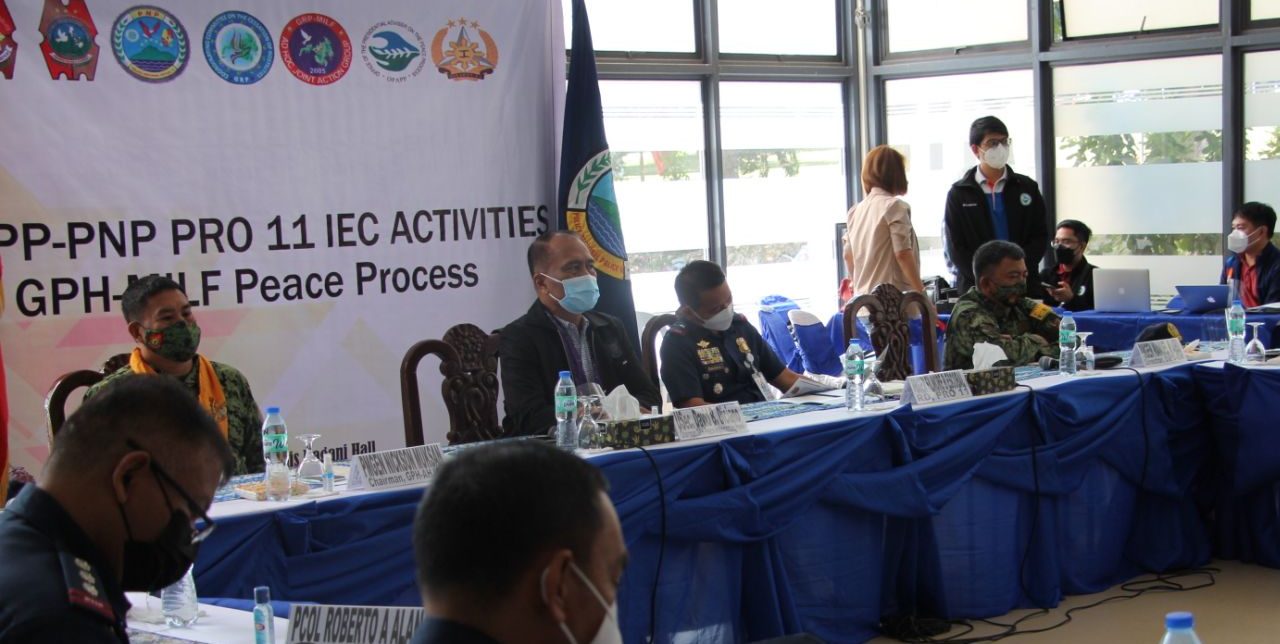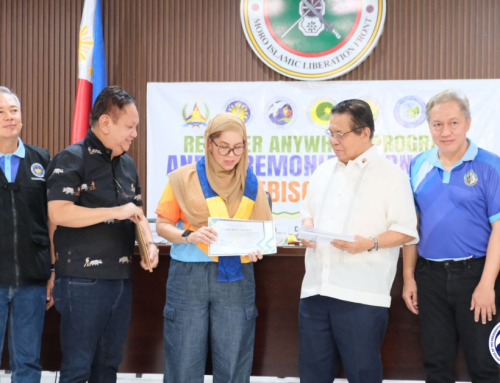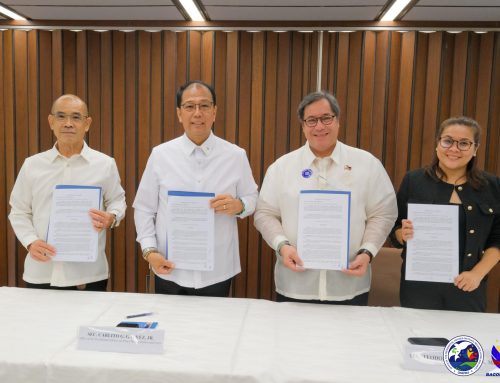DAVAO CITY (30 July 2021) — The implementation of the various components under the normalization track of the Comprehensive Agreement on the Bangsamoro (CAB) continues to gain momentum amid challenges in the peace, security and health fronts.
This was the assessment made by Office of the Presidential Adviser on the Peace Process (OPAPP) Undersecretary David Diciano during an information and education campaign attended by high-ranking officers of the Philippine National Police Regional Office 11 on Wednesday, July 29.
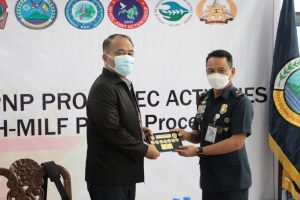
Security component ‘peaking’
According to Diciano, who also chairs the Government of the Philippines Peace Implementing Panel (GPIP), all of the initiatives under the normalization track’s security aspect that were launched in 2020 “are peaking.”
“Those programs that we have taken on, especially on the security aspect – the disbandment of private armed groups (DPAGs), dispute resolution, and management of small arms and light weapons (SALW) – all of these took off last year,” he said.
OPAPP signed Memoranda of Agreement with five provincial local government units in the Bangsamoro Autonomous Region in Muslim Mindanao (BARMM) in 2020 to officially launch the program on SALW.
In Basilan, 200 loose firearms were surrendered to local authorities on July 19, 2021, while 17 former violent extremists (FVEs) in Maguindanao turned over their firearms just a few days after the program on SALW was launched in the province July 13, 2021.
The FVEs will be provided with livelihood assistance through the SALW program.
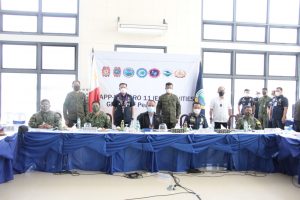
Under the program on dispute resolution which aims to resolve ridos (family feuds) in the BARMM, OPAPP signed Memoranda of Agreement with local government units in North Cotabato, Maguindanao and Sulu.
Under the program on DPAGs, members of eight private armed groups operating in Maguindanao and North Cotabato have surrendered since the National Task Force on DPAGs was reconvened on November 4, 2020.
Also under the security aspect of the normalization track, 12,145 former Moro Islamic Liberation Front (MILF) combatants have been decommissioned. Of this number, 145 were decommissioned under phase 1, while 12,000 were decommissioned under phase 2.
Moreover, 2,100 weapons coming from 115 MILF units across Mindanao have also been decommissioned.
Another 28,000 MILF combatants are scheduled for decommissioning under phase 3 and 4. The third phase of decommissioning to be carried out by the Independent Decommissioning Body (IDB) is set to be held this year.
Rollout of socioeconomic programs
Under the socioeconomic development component of the normalization track, the Task Force for Decommissioned Combatants and their Communities (TFDCC) continues to roll out programs and projects for the decommissioned combatants (DCs), their families and communities.
These enhanced socioeconomic packages for the decommissioned combatants, which are being implemented in collaboration with various line agencies, include social protection, livelihood and employment assistance, capacity development, and community-based physical infrastructure.
OPAPP signed a MOA with the Technical Education and Skills Development Authority (TESDA) for the implementation of skills training programs for the DCs.
The peace agency also inked a MOA with the Department of Labor Employment (DOLE) for the implementation of integrated livelihood and emergency employment programs for the DCs.
OPAPP likewise forged a MOA with the Department of Trade and Industry (DTI) for the implementation of the Peaceful Return and Aggressive Inclusion Social Entrepreneurship (PRAISE) Program.
Sustaining the gains of peace
Under the normalization track’s capacity building component, Joint Task Forces on Camps Transformation (JTFCTs) were established to assess the needs, plan programs, and undertake measures to transform six previously acknowledged MILF camps into peaceful and productive communities.
The JTFCTs for each of the MILF camps, composed of one representative each from the national government and MILF, engaged the Bangsamoro Planning and Development Authority in the crafting of a Camps Transformation Plan (CTP).
Likewise, the JTFCTs formulated a Camps Transformation Investment Program (CTIP). The CTP and CTIP are currently being reviewed by the GPH and MILF Implementing Panels.
Another confidence building measure is the issuance of Proclamation No. 1090, “granting amnesty to members of the MILF who have committed crimes punishable under the Revised Penal Code and special penal laws in furtherance of their political beliefs.”
A National Amnesty Commission was also created by virtue of Executive Order No. 125.
Healing the wounds of the past
Under the Transitional Justice and Reconciliation (TJR) component of the normalization track, a Transitional Justice and Reconciliation Commission (TJRC) was created in 2014.
The TJRC conducted a study and recommended to the GPH and MILF Implementing Panels appropriate mechanisms to address the legitimate grievances of the Bangsamoro people, correct historical injustices, and address human rights violations.
In 2016, the commission officially turned over its main report to the GPH and MILF Peace Panels for appropriate action.
In 2019, the terms of reference of the Technical Working Group on TJR (TWG-TJR) was signed by the GPH and MILF Panels. The body’s main task is to formulate a roadmap to implement the recommendations of the TJRC.
The roadmap is now being reviewed by the MILF Panel.
Since last year, the TWG-TJR has conducted a series of EIC campaigns and community dialogues in Camp Darapanan in Sultan Kudarat; Malisbong, in Palimbang, Sultan Kudarat; and Manili, in Carmen, North Cotabato.
Political track milestones
In his presentation during the forum, Director Ishmael Bahjin, head of the GPH-MILF Implementing Panel Secretariat, highlighted the gains achieved by the national government under the political track of the CAB.
Bahjin said these milestones include the passage of the Bangsamoro Organic Law (BOL) and the creation of the BARMM.
“With the BOL, we have a new form of government and you have the MILF now coming into the fold of the political arena,” he pointed out.
Bahjin also cited the establishment of the Inter-Governmental Relations Body (IGRB), which aims to coordinate and resolve issues between the national and Bangsamoro governments.
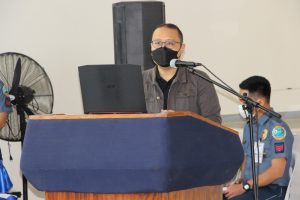
“There are so many issues between the national government and Bangsamoro government na walang venue na makapag-usap ang national and Bangsamoro government,” he noted.
But with the creation of the IGRB, Bahjin said “Both parties now have a venue not just to settle issues but also in providing assistance and support to the Bangsamoro government.”
He emphasized that both governments must give equal attention to the implementation of the political track “because this is where you will see the transition of the MILF into a legitimate political group.”
“This is still a fledgling government. It has only been recently established,” he said, adding that “through the political track, we will no longer look at them as a revolutionary group. They will be known as a political group participating in the political arena.”
Strengthening partnerships
In the meantime, Maj. Gen. Manuel Abu, director of the Directorate for Integrated Police Operations – Eastern Mindanao, underscored the importance of the IEC campaign being conducted by the GPH Implementing Panel among its stakeholders.
“With the discussions today, I have learned more. Recognizing (the) justness and legitimacy of the cause of the Bangsamoro people and their desire to map their political aspiration will form a deeper understanding between parties through a democratic process,” Abu said.
He said that the OPAPP-PNP IEC campaign will help strengthen partnerships and define vital roles of partners in this process, and at the same time, “develop a respectful relationship between the GPH and MILF through info education and communication.”
“It will give emphasis in our undertaking towards our common goal. It will open opportunities to share ideas and views to fully understand the deep-seated cause of armed conflict in the BARMM,” Abu said.
For his part, Diciano said the IEC campaign is part of the continuing activities of GPIP to update its peace partners on key developments in the Bangsamoro peace process.
“Through this forum, we will develop a better understanding of each other. These are the information we would like to share with you so that we can prevent misunderstanding or situations of conflict. Our security forces have already matured,” he said. END


